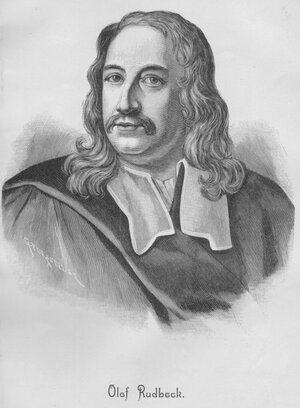Olof (Olaus) Rudbeck, born 1630 (baptised 12 December) in Västerås and died 17 September 1702 in Uppsala, was an anatomist, medical doctor, historian, natural scientist, architect, composer and musician. One of Sweden’s foremost ‘Renaissance Men’ during the country’s Great Power period, he became, among other things, professor in medicine and chancellor of Uppsala University, with an approach to science that was modern for his time. Moreover, he made lasting contributions to the musical life in Uppsala.
Copperplate by C. Forssell
Early musical activities
Olof Rudbeck was the son of bishop Johannes Rudbeck (1581−1646), who during his time as bishop in Västerås was animatedly engaged in the city’s music life. No details are known about Olof Rudbeck’s musical education during this time, but he was already known at a young age for his strong and resonant bass voice. He could also play a number of instruments. The first known occasion that bears witness to Rudbeck’s involvement in musical activities after his arrival in Uppsala in 1648 is a performance for Queen Kristina at Uppsala Castle in 1651, in which he played the shawm (a double-reeded instrument related to the modern oboe), among other things.
Cultivating music in Uppsala
During his entire time in Uppsala, Rudbeck put significant effort into improving and preserving musical activities at the university. The university’s Collegium musicum performed generally speaking for the larger feast days of the church year, for the changing of the chancellor and in conjunction with royal visits. During his first period as the university’s chancellor in 1662, Rudbeck drew up renewed by-laws for musical activities. The standards were raised through support to musically gifted students, free lessons and the purchase of both music and instruments.
Olof Rudbeck also took an active interest in the Uppsala Cathedral’s organs, seeing to repairs and new acquisitions. The organ that was purchased from Germany with the financial support of King Charles XI was not merely installed as it was, but rather, Rudbeck commissioned the construction of special technical solutions to accommodate it. Among other things, pipes were placed in the bottom of the organ’s console and the manuals stood independently relative to the rest of the organ. The instrument was destroyed in Uppsala’s great fire of 1702, but its constitution is known due to a thesis from 1717, Instrumenta musica.
Music for the Swedish hymnal and original compositions
Together with Harald Vallerius (1646−1716), likely Rudbeck’s most successful student and a music colleague at the university, Rudbeck was given the task of compiling and editing melodies with basso continuo for the first national hymnal to be published in 1695. However, the majority of this work was completed by Vallerius.
Rudbeck is known to have participated at several significant occasions as leader, soloist, musician and composer, including Axel Oxenstierna’s funeral (1654), King Charles X Gustav’s funeral (1660), Jakob August De la Gardie’s funeral (1662), the coronation of King Charles XI (1675) and the centennial celebration of 1693 (to commemorate the Uppsala Synod of 1593). Compositions by Rudbeck from two of these occasions have been preserved. They reveal a good feel for affect and the interplay between text and music, but it is also clear that Rudbeck was not an skilled composer.
Maria Schildt © 2016
Trans. Nicole Vickers
Bibliography
Annerstedt, Claes: Olof Rudbeck den äldre: kort lefnadsteckning, Stockholm: Norstedt, 1905.
Berglund, Lars: ‘Olof Rudbeck’, in: Die Musik in Geschichte und Gegenwart, neubearb. Aufl., Ludwig Finscher (ed.), vol. 14, Kassel: Bärenreiter 1994−2007.
Bergrot, Olau Olai: Exercitium academicum instrumenta musica leviter delineans …, Upsaliae: Typis Wernerianis, 1717.
Davidsson, Åke: Kring Uppsalaakademiens förvärv av musikalier på 1600−talet, Uppsala: Uppsala universitetsbibliotek, 1969.
Drei Vokalwerke der schwedischen Grossmachtepoche, Carl-Allan Moberg, Jan Olof Rudén eds, Stockholm: Edition Reimers, 1976.
Eriksson, Gunnar, ‘Olof Rudbeck’, in: Svenskt biografiskt lexikon, vol. 30 (1998−2000), p. 640.
Eriksson, Gunnar: Rudbeck 1630–1702: liv, lärdom, dröm i barockens Sverige, Stockholm: Atlantis, 2002.
Esberg, Johannes: Laudatio funebris, qua polyhistori magno et medico ... Olao Rudbeckio patri, in regia universitate Upsaliensi seniori inclyto ... inscribit & consecrat Johannes Esbergius ... , Upsalie: Typis Wernerianis, 1703.
Göransson, Harald: Koralpsalmboken 1697: Studier i svensk koralhistoria, Göteborg: Gidlund, 1992.
Hansson, Karl-Johan: Koralpsalmboken 1697: en undersökning av dess tillkomst och musikaliska innehåll, Åbo: Åbo akademi, 1967.
Kyhlberg, Bengt: Det stora orgelbygget i Uppsala domkyrka 1664−1698, licentiatavhandling, Uppsala universitet, 1953.
−−−: Musiken i Uppsala under stormaktstiden: bidrag till dess historia grundade på en arkivinventering, vol. 1, diss., Uppsala universitet, 1974.
−−−: ‘Stormaktstidens chorus musicus’, in: Akademiska kapellet i Uppsala under 350 år: en översikt – från ‘chorus musicus’ till symfonisk samverkan, Anna Johnson (ed.), Uppsala: Uppsala universitet, 1977.
Moberg, Carl-Allan & Kyhlberg, Bengt: ‘Olof Rudbeck’, in: Sohlmans musiklexikon, vol. 5, Stockholm: Sohlman, 1979, p. 238.
Moberg, Carl-Allan: ‘Olof Rudbeck d ä och musiken’, in: Rudbecksstudier: festskrift vid Uppsala universitets minnesfest till högtidlighållande av 300−årsminnet av Olof Rudbeck d.ä.:s födelse, Uppsala: Almqvist & Wiksell, 1930.
Norlind, Tobias: ‘Musiken i Uppsala under 1600−talet’, in: Kult och Konst, 1908, pp. 29−42.
Schildt, Maria: Karl XI:s kröning 1675: musiken, musikerna och två anonyma festkompositioner ur Dübensamlingen, Uppsala: Uppsala universitet, 2004.
−−−: ‘Musiken vid Karl XI:s kröning’, in: Tidig musik, 2007, pp. 13−17.
Sjökvist, Peter: The music theory of Harald Vallerius: three dissertations from 17th−century Sweden, diss., Uppsala: Acta Universitatis Upsaliensis 2012.
Sources
Uppsala universitetsbibliotek
Summary list of works
Two preserved works: Sorg och Klagosång över Axel Oxenstierna and Herre Konungen fröjdar sig (for vocal ensemble and instruments).
Collected works
Sorg och Klagesång öffwer … H. AXEL OXENSTIERNA … Stockholms Storkyrkio den __ Anno 1654 componerat och stält aff Olao Rudbeck. New edition: Drei Vokalwerke der schwedischen Grossmachtepoche. Carl-Allan Moberg & Jan Olof Rudén (eds), Stockholm: Ed. Reimers, 1976.
Herre Konungen fröjdar sig. [Attributed by Maria Schildt, 2005.]
Samtalet emellan Gudh, Konungen och Landet. [Only the text is preserved.]


